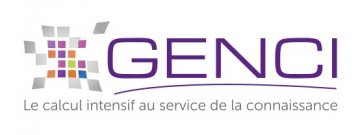
Grand Équipement National de Calcul Intensif
GENCI (Grand Équipement National de Calcul Intensif) has been created in 2007 with the mission to democratize the use of numerical simulation through high-performance computing (HPC) associated with the use of artificial intelligence (AI), to support French scientific and industrial competitiveness. Since end of 2021, GENCI’s is also in charge, in the scope of the French Quantum Plan, to acquire and make available all quantum technologies of the French Hybrid Quantum Initiative. (HQI). GENCI is a “civil company” (société civile) under the French law, and 49% owned by the State, represented by the Ministère en charge de l’Enseignement supérieur et de la recherche et de l’innovation, 20% by CEA, 20% by CNRS, 10% by the Universities, which are represented by the Conférence des présidents d’Université, and 1% by Inria. GENCI’s role is to implement the national strategy for equipping in HPC and storage resources/services the three national computing centres (TGCC for CEA, IDRIS for CNRS and CINES for French Universities) and making the systems available for French researchers; to support the creation of an integrated European high performance computing ecosystem; to work to promote numerical simulation and high-performance computing within the academic and industrial communities. In 2022, the 3 national supercomputers of GENCI, hosted and operated in TGCC, IDRIS and CINES are representing a cumulated peak performance of more than 130 petaflop/s, based on complementary architectures, for addressing the daily needs of > 3000 users and as a hosting member of PRACE, its Joliot-Curie supercomputer is a Tiers 0 system available to the European academic and industriel users for open research.
Role within HPCQS
GENCI will be one of the 2 hosting entities (with JSC/FZJ) to integrate and tightly coupled its Tiers 0 supercomputer Joliot-Curie to a 100+ quits quantum simulator to serve the interest of the HPCQS project. In that purpose, GENCI is leading HPCQS WP2 relative to the procurement of the QS, their integration with supercomputers as their operationability as the follow-up of quantum technology watch including accessing small-scale quantum prototypes based on different QPU technologies. GENCI is also involved in WP4 and WP5, mostly in the software environment which will both allow the development the hybrid software stack as to support the development of end user application. GENCI is also involved in the dissemination, communication, project exploitation and peer-review process to grant HPCQS ressources in the WP6.






